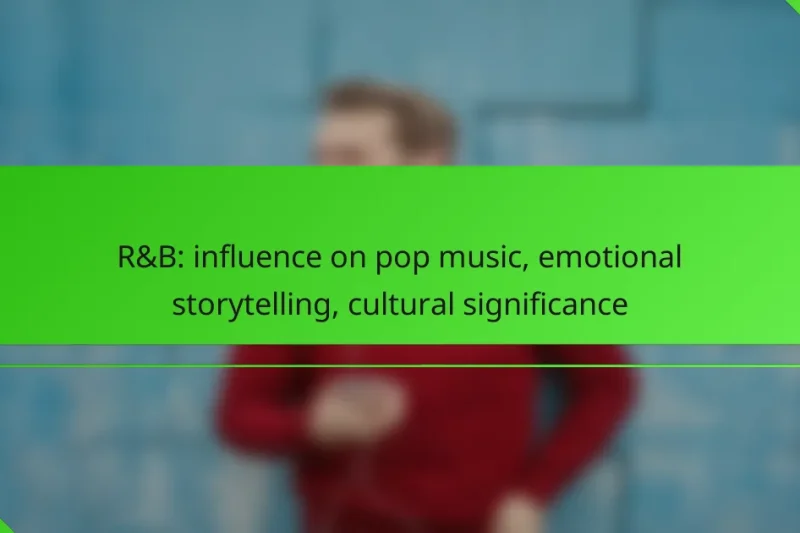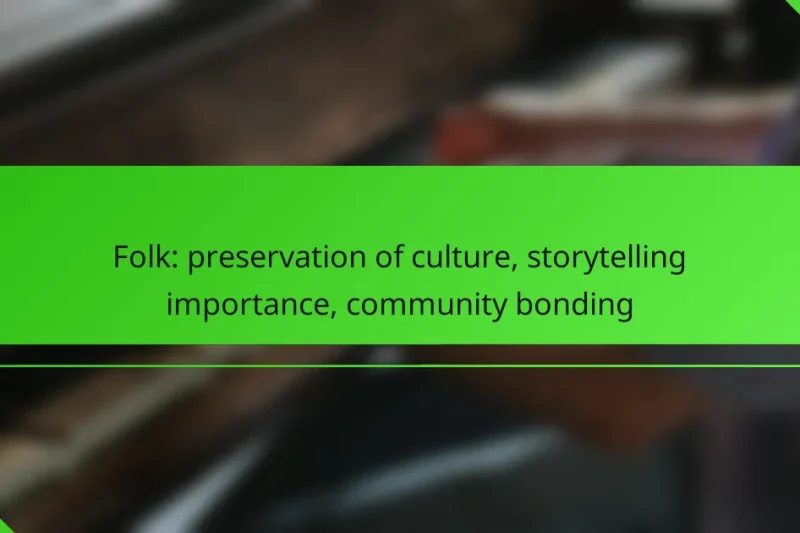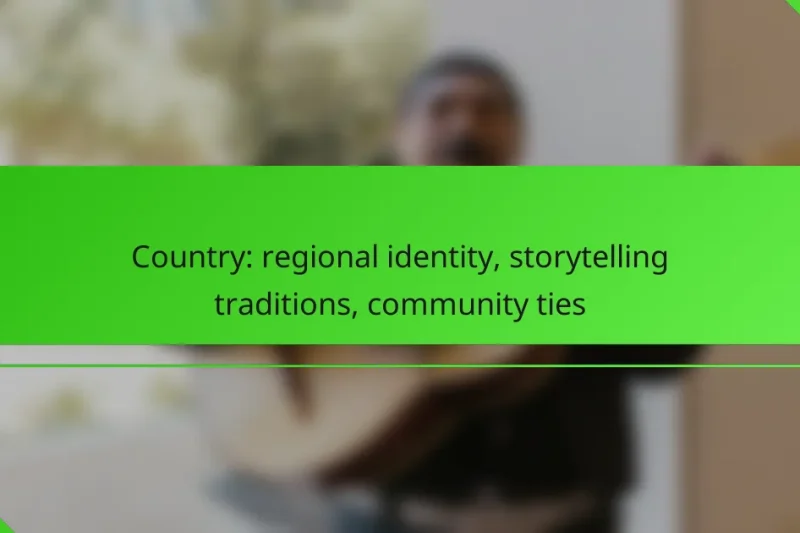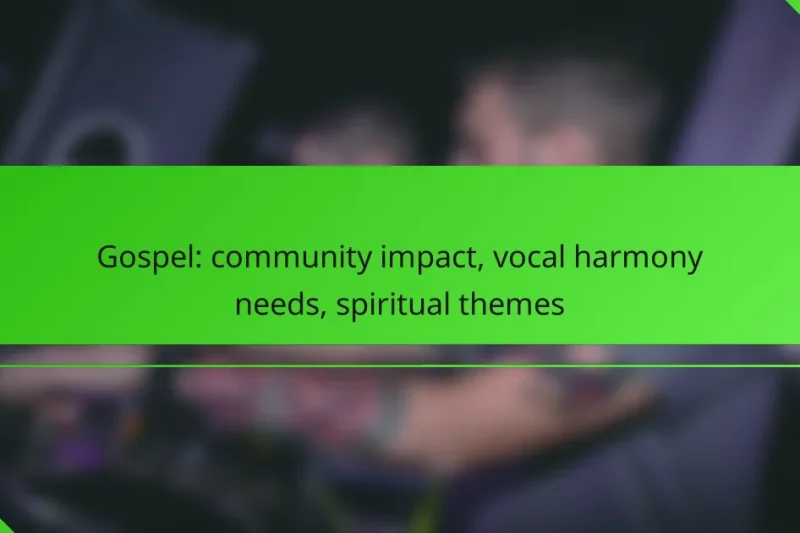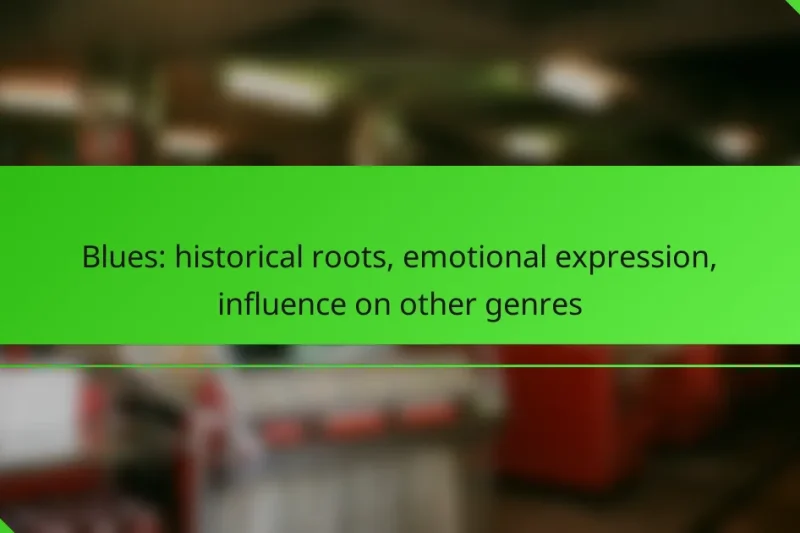R&B has a profound influence on pop music, particularly in Canada, where its rhythms and emotional … R&B: influence on pop music, emotional storytelling, cultural significanceRead more
The Impact of Music Genres on Culture
Music genres are a powerful force in shaping cultural identity, reflecting the diverse backgrounds and experiences of communities. In Canada, they not only foster a sense of belonging but also influence economic growth and social movements, highlighting their multifaceted impact on society.
Folk: preservation of culture, storytelling importance, community bonding
Folk culture is essential for preserving community identity, as it upholds traditions, stories, and practices that … Folk: preservation of culture, storytelling importance, community bondingRead more
Pop: global influence, commercial success, trendsetting
Pop music serves as a dynamic force in global culture, influencing everything from fashion trends to … Pop: global influence, commercial success, trendsettingRead more
Country: regional identity, storytelling traditions, community ties
In Canada, storytelling traditions are vital for shaping regional identities and preserving cultural heritage, particularly among … Country: regional identity, storytelling traditions, community tiesRead more
Gospel: community impact, vocal harmony needs, spiritual themes
Gospel music plays a vital role in shaping communities in Canada by promoting unity and inspiring … Gospel: community impact, vocal harmony needs, spiritual themesRead more
Jazz: cultural fusion, historical significance, artistic expression
Jazz is a powerful form of artistic expression that embodies cultural fusion, drawing from a rich … Jazz: cultural fusion, historical significance, artistic expressionRead more
Alternative: genre flexibility, audience expectations, artistic expression
In today’s artistic landscape, genre flexibility empowers creators to merge various styles, resulting in innovative works … Alternative: genre flexibility, audience expectations, artistic expressionRead more
Electronic: nightlife culture, technological advancement, artistic innovation
Electronic music is reshaping nightlife culture by fostering vibrant spaces for social interaction and artistic expression, … Electronic: nightlife culture, technological advancement, artistic innovationRead more
Blues: historical roots, emotional expression, influence on other genres
The Blues originated from the cultural exchanges between African American communities and local musicians, particularly in … Blues: historical roots, emotional expression, influence on other genresRead more
Classical: educational impact, cultural heritage, artistic legacy
The classical tradition plays a vital role in shaping modern education, fostering critical thinking and interdisciplinary … Classical: educational impact, cultural heritage, artistic legacyRead more
How do music genres influence cultural identity in Canada?
Music genres play a significant role in shaping cultural identity in Canada by reflecting the diverse backgrounds and experiences of its people. Each genre resonates with different communities, fostering a sense of belonging and shared identity through lyrics, rhythms, and traditions.
Hip-hop as a voice for marginalized communities
Hip-hop in Canada serves as a powerful platform for marginalized communities, allowing artists to express their struggles and aspirations. This genre often addresses social issues such as racism, poverty, and inequality, resonating deeply with listeners who share similar experiences.
For example, Canadian hip-hop artists like K’naan and Drake have used their music to highlight the challenges faced by their communities while also celebrating their cultural heritage. This connection fosters solidarity and encourages dialogue around important societal issues.
Country music and rural identity
Country music is closely tied to rural identity in Canada, often reflecting the values, lifestyles, and stories of those living outside urban centers. The genre emphasizes themes such as family, hard work, and connection to the land, resonating with listeners who identify with these experiences.
Artists like Shania Twain and Gordon Lightfoot have brought Canadian rural stories to the forefront, showcasing the unique cultural landscape of the countryside. This representation helps strengthen community ties and preserves local traditions through music.
What are the economic impacts of music genres on Canadian culture?
The economic impacts of music genres on Canadian culture are significant, influencing revenue generation, job creation, and local economies. Different genres attract diverse audiences, leading to varying economic benefits across regions.
Revenue generation from music festivals
Music festivals in Canada generate substantial revenue, often reaching millions of Canadian dollars annually. Major events like the Calgary Stampede and Osheaga not only draw large crowds but also stimulate local businesses, including hotels, restaurants, and retail shops.
These festivals create numerous job opportunities, from event management to hospitality services. Additionally, they often feature local artists, promoting regional talent and further enhancing the local economy.
Impact of streaming services on local artists
Streaming services have transformed how local Canadian artists reach their audiences, providing platforms for exposure and revenue generation. While these services can offer artists a wider audience, they often pay lower per-stream royalties, which can impact income.
Local musicians must adapt by leveraging social media and digital marketing to build their brands. Collaborations with other artists and participation in local events can enhance visibility and create additional revenue streams beyond streaming.
How do music genres shape social movements in Canada?
Music genres play a significant role in shaping social movements in Canada by providing a platform for expression and mobilization. Genres like punk rock and Indigenous music have been particularly influential in voicing dissent and reviving cultural identities.
Punk rock and anti-establishment sentiments
Punk rock emerged in Canada as a powerful voice against authority and societal norms, often reflecting anti-establishment sentiments. Bands like D.O.A. and The Subhumans used their music to critique political issues, encouraging listeners to question the status quo.
This genre often fosters a sense of community among its followers, creating spaces for activism and protest. Punk shows frequently serve as venues for distributing information about social causes, amplifying the message of resistance.
Indigenous music and cultural revival
Indigenous music in Canada plays a crucial role in cultural revival and the assertion of identity. Artists like Buffy Sainte-Marie and A Tribe Called Red blend traditional sounds with contemporary styles, promoting Indigenous narratives and issues.
This genre not only preserves cultural heritage but also raises awareness about social injustices faced by Indigenous communities. Through music, these artists engage audiences in discussions about reconciliation, land rights, and cultural pride, fostering a deeper understanding of Indigenous experiences in Canada.
What role do music genres play in youth culture?
Music genres significantly influence youth culture by shaping identities, social interactions, and lifestyle choices. They serve as a medium for self-expression and community belonging, allowing young people to connect with peers who share similar tastes and values.
Pop music and trends among Canadian youth
Pop music is a dominant force in shaping trends among Canadian youth, often dictating fashion, language, and social behavior. Artists like Justin Bieber and Drake have not only topped charts but also influenced youth culture through their styles and public personas.
Many Canadian youth engage with pop music through social media platforms, where viral trends can emerge quickly. This interaction fosters a sense of community, as fans share content and participate in challenges related to their favorite songs.
Electronic dance music and community building
Electronic dance music (EDM) plays a crucial role in community building among youth, particularly through festivals and local events. These gatherings create immersive experiences where young people can connect, dance, and express themselves freely.
In Canada, events like the Electric Daisy Carnival and local raves attract thousands, fostering a sense of belonging and shared identity among attendees. The culture surrounding EDM often emphasizes inclusivity and positivity, making it a welcoming space for diverse groups.
How do music genres affect intercultural exchange in Canada?
Music genres significantly influence intercultural exchange in Canada by fostering connections between diverse communities. Genres such as hip-hop, folk, and electronic music often blend elements from various cultures, creating a rich tapestry of sound that encourages collaboration and understanding.
Fusion genres and multicultural collaboration
Fusion genres, which combine elements from different musical traditions, play a crucial role in promoting multicultural collaboration. For instance, Canadian artists often merge Indigenous music with contemporary styles like pop or rock, resulting in unique sounds that resonate with wider audiences. This blending not only showcases cultural diversity but also invites dialogue among various cultural groups.
Collaborative projects, such as festivals and workshops, further enhance these fusion genres. Events like the Toronto Jazz Festival often feature artists from multiple backgrounds, allowing them to share their musical heritage while creating new works together. This interaction fosters a sense of community and mutual respect among participants.
Influence of immigrant music on mainstream culture
Immigrant music significantly shapes mainstream culture in Canada by introducing new rhythms, instruments, and themes. Genres like reggae, salsa, and bhangra have gained popularity, influencing everything from radio playlists to dance trends. This integration reflects the country’s multicultural identity and enriches the overall music scene.
Moreover, the success of immigrant artists in the Canadian music industry highlights the importance of diverse voices. Artists such as K’naan and Jessie Reyez have achieved mainstream success, showcasing how immigrant music can resonate with a broad audience. This trend encourages the acceptance of various cultural expressions and promotes a more inclusive society.
What are the historical influences of music genres on Canadian culture?
Music genres have significantly shaped Canadian culture by reflecting the country’s diverse heritage and social movements. From Indigenous sounds to contemporary pop, each genre contributes to the national identity and cultural dialogue.
Folk music and Canadian heritage
Folk music is deeply rooted in Canadian heritage, often telling stories of the land and its people. Traditional folk songs, influenced by Indigenous, French, and British cultures, serve as a means of preserving history and cultural values.
In Canada, folk music festivals celebrate this genre, showcasing artists who keep these traditions alive. Events like the Mariposa Folk Festival attract thousands, highlighting the importance of folk music in fostering community and cultural pride.
Rock music’s evolution in Canada
Rock music in Canada has evolved through various phases, influenced by both local and international trends. Starting in the 1960s, Canadian rock bands like The Guess Who and Rush gained global recognition, contributing to the genre’s development.
Today, Canadian rock continues to thrive, with a mix of classic and modern influences. Artists such as Arcade Fire and Metric reflect the genre’s adaptability, often blending rock with other styles, which resonates with a diverse audience across the country.
How do music genres impact mental health and well-being?
Music genres significantly influence mental health and well-being by affecting mood, reducing stress, and enhancing emotional expression. Different styles can evoke various feelings, making them useful tools for managing mental states and promoting overall wellness.
Therapeutic benefits of classical music
Classical music is often used in therapeutic settings due to its calming effects. Research suggests that listening to classical compositions can lower anxiety levels and improve focus, making it beneficial for individuals dealing with stress or mental fatigue.
Incorporating classical music into daily routines, such as during work or relaxation, can enhance productivity and create a serene environment. Many therapists recommend specific pieces, like those by Bach or Mozart, for their soothing qualities.
Community support through local music scenes
Local music scenes foster community support and connection, which are vital for mental health. Engaging with local artists and attending live performances can create a sense of belonging and shared experience, helping to combat feelings of isolation.
Participating in community music events, such as open mic nights or local festivals, encourages social interaction and emotional expression. These gatherings often provide a platform for individuals to share their stories and connect with others, enhancing overall well-being.
What are the emerging trends in music genres affecting Canadian culture?
Emerging trends in music genres are significantly shaping Canadian culture by influencing social interactions, artistic expression, and community engagement. Genres like hip-hop, indie rock, and electronic music are gaining traction, reflecting diverse cultural narratives and fostering local talent.
Growth of virtual concerts
The rise of virtual concerts has transformed how Canadians experience live music, especially since the pandemic. Artists are increasingly using platforms like YouTube and Twitch to reach wider audiences without geographical limitations.
This trend allows fans to enjoy performances from the comfort of their homes, often at lower costs compared to traditional concerts. Many virtual events also incorporate interactive elements, enhancing audience engagement and creating a sense of community.
Influence of social media on music discovery
Social media platforms like TikTok and Instagram are reshaping how Canadians discover new music. Short video clips and viral challenges often propel songs into the mainstream, allowing independent artists to gain visibility quickly.
These platforms enable users to share their musical preferences and connect with others who have similar tastes, fostering a more personalized music discovery experience. However, artists must navigate trends carefully to maintain authenticity while engaging with their audience.
